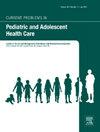Emerging therapeutics in the management of food allergy
IF 3.7
4区 医学
Q1 PEDIATRICS
Current Problems in Pediatric and Adolescent Health Care
Pub Date : 2025-01-01
DOI:10.1016/j.cppeds.2025.101732
引用次数: 0
Abstract
Food allergy therapy has experienced rapid growth over the past five years. In addition to avoidance measures and reactive treatment of accidental exposures, physicians can now offer patients multiple therapies for reducing the risk of severe reactions upon accidental exposure, and potentially achieving sustained remission. Many promising therapies are also in the pipeline.
In this review, we outline the clinical management of food allergy, including mainstream non-pharmaceutical therapies, such as food oral immunotherapy (OIT), as well as three FDA-approved therapies: Palforzia (pharmaceutical peanut oral immunotherapy), omalizumab (anti-IgE monoclonal antibody), and Neffy (intranasal epinephrine).
We also discuss emerging therapies, including novel routes of immunotherapy administration (epicutaneous, subcutaneous, sublingual, oral mucosal) and existing immunomodulatory therapies undergoing trials for use in food allergy, including dupilumab (anti-IL-4 and IL-13 monoclonal antibody), abrocitinib (oral JAK inhibitor) and abatacept (IgG-CTLA-4 fusion protein).
治疗食物过敏的新疗法。
食物过敏治疗在过去五年中经历了快速发展。除了避免意外暴露的措施和反应性治疗外,医生现在可以为患者提供多种治疗方法,以减少意外暴露后严重反应的风险,并有可能实现持续缓解。许多有前景的疗法也在研发中。在这篇综述中,我们概述了食物过敏的临床管理,包括主流的非药物治疗,如食品口服免疫治疗(OIT),以及fda批准的三种治疗方法:Palforzia(药物花生口服免疫治疗),omalizumab(抗ige单克隆抗体)和Neffy(鼻内肾上腺素)。我们还讨论了新兴的治疗方法,包括新的免疫治疗给药途径(表皮、皮下、舌下、口腔粘膜)和现有的用于食物过敏的免疫调节疗法,包括杜匹单抗(抗il -4和IL-13单克隆抗体)、阿布替尼(口服JAK抑制剂)和阿巴接受(IgG-CTLA-4融合蛋白)。
本文章由计算机程序翻译,如有差异,请以英文原文为准。
求助全文
约1分钟内获得全文
求助全文
来源期刊
CiteScore
4.60
自引率
0.00%
发文量
61
审稿时长
5 days
期刊介绍:
Recognized for its probing, comprehensive, and evidence-based reviews, Current Problems in Pediatric and Adolescent Health Care devotes each issue to a timely and practical topic in pediatric medicine, presented by leading authorities in the field. The journal offers readers easily accessible information that enhances professional experience and is pertinent to daily pediatric practice. Each issue''s review article is accompanied by an additional special feature designed to highlight a particular aspect of the topic presented.

 求助内容:
求助内容: 应助结果提醒方式:
应助结果提醒方式:


